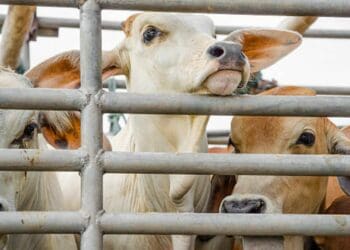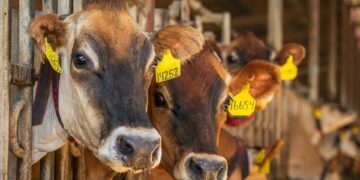Since exiting default late last year, Land Bank’s turnaround is beginning to yield encouraging results, with emerging success stories from farmers transitioning into commercial producers, upcoming innovative insurance products, and renewed efforts to support farmer bankability.
This is according to Land Bank CEO Themba Rikhotso, who spoke candidly about the institution’s turnaround strategy during the Land Bank lunchtime conversations with Food For Mzansi at Nampo Harvest Day in Bothaville, Free State.
During a panel discussion themed “Unlocking the future of agriculture“, Rikhotso said, “Getting the bank out of default is most certainly another very proud moment. It has been very difficult.”
He highlighted the bank’s flagship blended finance initiative as one of its proudest milestones, noting that it surpassed its original targets. The initial plan was to implement blended finance and related top-tier grants valued at approximately R325 million. By the end of April, approvals had already exceeded R3 billion, with more than two-thirds of that amount allocated specifically as grants, a significant achievement in the programme’s rollout.
Rikhotso reflected on site visits to beneficiaries, describing the farmers as thriving and firmly positioned as commercial producers.
He also emphasised Land Bank’s growing role in disaster relief, with R1.8 billion disbursed over the past two years, a testament to the institution’s ongoing commitment to supporting farmers in times of crisis.
Related stories
- RSVP now for Land Bank conversations at Nampo
- Land Bank launches Agro-Energy Fund to power SA farmers
- Land Bank: Blended finance gives SA farmers a fighting chance
Targeted support for small-scale farmers
Addressing the needs of small-scale producers, Land Bank Insurance Company managing director Pascal Siphugu discussed new insurance offerings designed for non-commercial farmers.
Siphugu announced that Land Bank will soon unveil an innovative crop-equivalent insurance product designed to support farmers during drought conditions.
“We launched a few products that are meant to support the small-scale farmers. One is the pasture drought, which assists cattle and livestock owners in the event of moisture deficits to support grazing.”
Pascal Siphugu
Training has been central to this approach, with over 2 500 farmers receiving education on risk mitigation and insurance in the past year. Siphugu noted that the goal has been to simplify these concepts and make them more accessible.
Transformation within the sector remains a key focus. Concerned by the slow pace of change, Siphugu explained how the team has worked to build a supportive value chain. Initiatives like the Black Broker and Black Assessor programmes are equipping young people, 60% of whom are women, with the skills to act as intermediaries between farmers and insurers.
Levelling the playing field for farmers
Litha Kutta, who leads partnership development and ecosystem coordination at Land Bank, outlined how the institution is reimagining its role in agriculture.
“The challenges of farmers go beyond finance. Farmers struggle to get market access. They’re struggling with commodities. They’re struggling with capacity building. They’re struggling with compliance.”
In response, Land Bank has established a partnership team dedicated to helping farmers overcome these challenges even before applying for finance. This includes linking them to markets, supporting compliance, offering technical assistance, and assisting with the application process.
One of the key initiatives nearing completion is a credit guarantee, aimed at supporting farmers who lack sufficient collateral to access finance.
In addition, Land Bank is committed to building long-term partnerships with farmers. Rather than offering one-off assistance, the bank supports farmers over multiple seasons, including securing market access and arranging contracts for specific produce, opportunities that farmers might otherwise miss.
Dr Takisi Masiteng, senior advisor to the Free State premier, also joined the conversation and praised Land Bank’s evolving role.
“One of the responsibilities of government departments is to level the playing field and make sure that institutions like the Land Bank work towards their mandate,” he said.
Masiteng highlighted the blended funding model, where grants are combined with loans, as a significant success. “Government realised that if you pursue funds only, they’re not going to make it. If you bring in that element of a loan, that has assisted a lot and is beginning to yield results.”
He noted that in the Free State, more than 30 farmers are now participating in blended finance programmes.
READ NEXT: Water rights: Here’s what farmer buyers should know
Sign up for Mzansi Today: Your daily take on the news and happenings from the agriculture value chain.
















